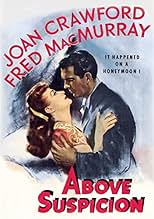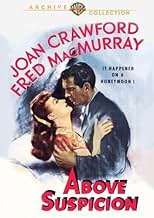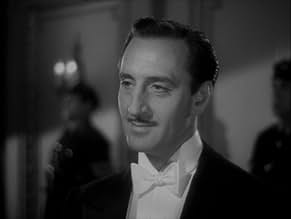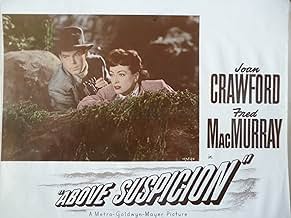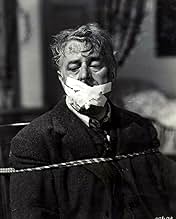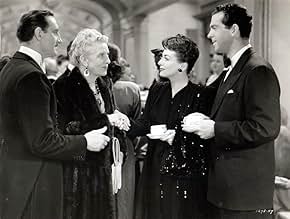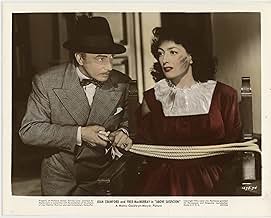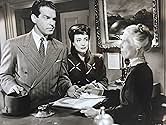Ajouter une intrigue dans votre langueOxford Professor Richard Myles and his new bride Frances are off on a European honeymoon. It isn't the typical honeymoon: they are on a spying mission for British Intelligence on the eve of ... Tout lireOxford Professor Richard Myles and his new bride Frances are off on a European honeymoon. It isn't the typical honeymoon: they are on a spying mission for British Intelligence on the eve of World War II.Oxford Professor Richard Myles and his new bride Frances are off on a European honeymoon. It isn't the typical honeymoon: they are on a spying mission for British Intelligence on the eve of World War II.
- Réalisation
- Scénario
- Casting principal
- Récompenses
- 1 victoire au total
- Ottilie
- (as Lotta Palfi)
- Student
- (non crédité)
- German Woman
- (non crédité)
- Poet at Frisky Rabbit
- (non crédité)
- Guide
- (non crédité)
- German Boy
- (non crédité)
Avis à la une
The year is 1939, before war breaks out. Crawford plays a newlywed, and Fred MacMurray her American husband, who teaches at Oxford. The couple are asked by the foreign office to track down someone while honeymooning in Germany, a man who can help the Allies regarding a German secret weapon. This weapon is a magnetic water bomb that is pulled to a ship and explodes. At first, it's fun; then it becomes dangerous.
This is an entertaining film in part thanks to a good cast of Crawford, MacMurray, Basil Rathbone, and Conrad Veidt. There are some suspenseful sequences. There is also some real stuff of spy books and films - special hats, song codes, codes on maps and in books.
"Above Suspicion" doesn't seem very big budget and despite some Bavarian costumes and quaint German towns, it's all Hollywood set. Given the huge films Crawford took part in at MGM, this black and white movie must have seemed like a come-down. It was. Louis B didn't want over the hill actresses - i.e., those over 30. There's nothing special about her part, which could have been done by any MGM stock player. And at 38, for those days, she was a little old to be a bride. Better things were on the horizon for Crawford, though she couldn't have known it at the time.
Worth seeing.
An odd movie even for its time, being clearly anti-Nazi and a bit of an American adventure on behalf of the British, but set in the months before the war began, earlier 1939. Yet it was made and was released in the thick of the war, four years later, well after even the Americans were involved. It must have seemed a bit lightweight at the time, and it certainly is a bit breezy now, too.
Joan Crawford is at her best when life is going wrong, when the screws are applied or when she has to be a tough and independent women. Here she plays a cheerful and rather carefree newlywed. What Crawford character is truly carefree? Well, in this case her husband is perfectly cast, because Fred MacMurray knows what carefree is better than anything. When the Nazi threat becomes violent, things turn out rather okay, at least at first. The only other actor of note is the Nazi figure, played by the guy who plays Sherlock in all those B-Movie Sherlock Holmes films, Basil Rathbone, and you can't quite make him out as the evil menace he needs to be.
Of course, our leading odd couple has been chosen for this mission by some knowing British officials who see the American innocence as a perfect cover for what is actually pretty dangerous stuff. And the movie, despite all these essential weaknesses, is really fun and a bit dramatic and very well made. Yes, it's a good movie, if far from a great one in either importance or effect.
The director, Richard Thorpe, is one of the step-in-when-needed guys with a bunch of B-movies under his belt, and an assortment of mediocre oddballs (a Tarzan movie, the last Thin Man, a Presley movie--Jailhouse Rock--some Westerns, and so on). It might be a miracle this is as workable as it is. The script is fair, but the mood and the setting is terrific. And really, as mismatched as they seem, Crawford and MacMurray are not half bad together. They certainly are trying very hard.
Good entertainment with some amusing dialogue and light-hearted performances by Joan and Fred that indicate they should have been teamed more than once. As it is, this is Joan Crawford's last film at Metro after seventeen years with the studio and comes just two years before "Mildred Pierce" at Warners. Good cast and fine production values make it an absorbing treat.
Le saviez-vous
- AnecdotesThis was the final film Joan Crawford made under her long-term contract with MGM, where she had been for the past eighteen years. Frustrated at being continuously offered what she considered second rate scripts, shortly after completing this, Crawford chose to buy out her studio contract (at great personal expense) and continue her career elsewhere. It was nearly two years later that she appeared in her next leading role, Le roman de Mildred Pierce (1945) at Warner Brothers, for which she won the 1945 Academy Award as Best Actress.
- GaffesThe song that represents Oxford in the film is the Eton Boating Song.
- Citations
[on their wedding night, a policeman appears at the Myles's hotel room door demanding Richard's depart with him immediately]
Frances Myles: This is no time for a practical joke.
Const. Jones: It's no joke, ma'am.
Frances Myles: It's not practical, either.
- ConnexionsReferenced in Unfinished Business (1985)
- Bandes originalesThe Wedding March
(1843) (uncredited)
from "A Midsummer Night's Dream, Op.61"
Music by Felix Mendelssohn
In the score after Frances and Richard's wedding
Meilleurs choix
Détails
- Durée1 heure 30 minutes
- Couleur
- Rapport de forme
- 1.37 : 1

